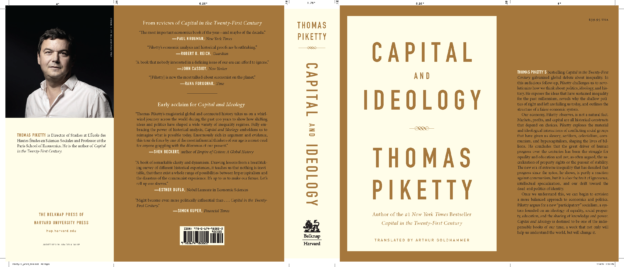

In this book, I spend a lot of time talking about other people’s work. I am very much against any deterministic view, and that’s why I venture into other territories. I stress the fact that human societies always have imagination in the way they structure an economic system. In the end, my main takeaway-as I say in the introduction of the book-is that the origins of inequality are more political and ideological than economic, technological, or even cultural.

I felt that this was necessary in order to better understand the evolution of inequality regimes. My study of ideology sometimes takes the direction of anthropology or political science. Now, that being said, you’re right that this new book is even more a book of social sciences than the previous two. Basically everything I have done over these past twenty years has been about the history of inequality. I have written three books: Top Incomes in France in the Twentieth Century in 2001, then Capital in the Twenty-First Century in 2013, and now Capital and Ideology in 2019. I view my work more as the work of a social scientist, at the frontier between economic history, social history, historical economics, and political economy, or however you want to phrase it. Thomas Piketty: First of all, let me make clear that I don’t have a strong identity as an economist. Can you say a bit why, as an economist, you organized Capital and Ideology in this interdisciplinary way? Of course, any interdisciplinary project comes with risks, since it requires commenting on fields in which you yourself may not be an expert. To tell the story you go well beyond traditional economics and venture into the fields of political science, history, sociology, and sometimes even literature and film. It undertakes a history of what you call “inequality regimes” across many eras and in many different regions of the world. Tocqueville 21 blog editors Danielle Charette and Jacob Hamburger recently spoke with Piketty about the history of inequality, his understanding of equality and democracy, and some bold solutions for restructuring economic relationships across the globe.ĭanielle Charette: Capital and Ideology is clearly an ambitious book.

Capital and Ideology, translated by our own Arthur Goldhammer, will appear in English on March 10. His latest book, Capital and Ideology, pushes the conversation on inequality a step further, examining the ideologies that justify inequality across history, and laying out a platform for what Piketty calls a “participatory socialism” for the twenty-first century. With the publication of Capital in the Twenty-First Century in 2013, Thomas Piketty became perhaps the world’s best-known chronicler and theorist of global inequality. Share the post "Education and Property for All: Thomas Piketty on Capital and Ideology"


 0 kommentar(er)
0 kommentar(er)
